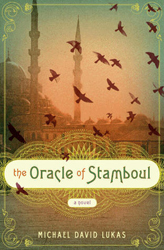Join a community of readers who are committed to Jewish stories
Sign up for JBC’s Nu Reads, a curated selection of Jewish books delivered straight to your door!
Michael David Lukas’ first book, The Oracle of Stamboul, is now available. He will be blogging all week for the Jewish Book Council and MyJewishLearning’s Author Blog.
 I’ve been thinking a lot these past few months about the year I spent in Tunisia. It was 2003, I had just graduated college and was living on the outskirts of Tunis. Officially, I was there as a Rotary Ambassadorial Scholar and was supposed to be studying Arabic while bridging the gap of understanding between the United States and the Arab World. It was, by all accounts, a good year. I did my best to bridge the gap between the United States and the Arab World, I read a trunk full of classic literature, and towards the end of the year I started writing what would later become my first novel, The Oracle of Stamboul. Those first few months, however, were full of loneliness and alienation. I missed my family and my friends, I missed my girlfriend, I missed being in college, and I missed those small American comforts (peanut butter, dryers, wood floors) which seemed not to exist in Tunisia. I had a few Tunisian friends at the internet cafe around the corner, and my Eastern European roommates — Ozzie and Petr — were good guys, though I had difficulty connecting with them at first. One reason for this was that I got up early for Arabic class and they stayed up late partying, drinking cheap Tunisian beer, and playing hair metal at the highest volume Petr’s tinny laptop speakers could bear.
I’ve been thinking a lot these past few months about the year I spent in Tunisia. It was 2003, I had just graduated college and was living on the outskirts of Tunis. Officially, I was there as a Rotary Ambassadorial Scholar and was supposed to be studying Arabic while bridging the gap of understanding between the United States and the Arab World. It was, by all accounts, a good year. I did my best to bridge the gap between the United States and the Arab World, I read a trunk full of classic literature, and towards the end of the year I started writing what would later become my first novel, The Oracle of Stamboul. Those first few months, however, were full of loneliness and alienation. I missed my family and my friends, I missed my girlfriend, I missed being in college, and I missed those small American comforts (peanut butter, dryers, wood floors) which seemed not to exist in Tunisia. I had a few Tunisian friends at the internet cafe around the corner, and my Eastern European roommates — Ozzie and Petr — were good guys, though I had difficulty connecting with them at first. One reason for this was that I got up early for Arabic class and they stayed up late partying, drinking cheap Tunisian beer, and playing hair metal at the highest volume Petr’s tinny laptop speakers could bear.
In those early months — before I met Nomi Stone, a Fulbright scholar/poet who will feature prominently in the next post — the only Jews I saw were those in the cemetery I passed on my way to school. I didn’t realize how much this absence of Jews bothered me until I found myself lying in bed one night with the pillow clutched over my head and the sounds of Whitesnake drifting through my door. “Here I go again on my own. Going down the only road I’ve ever known.” Those melancholy lyrics, accompanied by Ozzie’s warbled harmony, hit me like a sledge hammer, clarifying the alienation I had felt for months, the yawning distance between my current life and everything I knew myself to be. It wasn’t that I was living in a Muslim majority country with two uncircumcised Eastern Europeans. Rather, the absence of Jewishness in my life was like the absence of peanut butter. I never knew it existed until it wasn’t there.
And so, to cheer myself up, I decided to make a list of my top ten favorite Jews of all time. I slept on it, woke up that next morning, and wrote the list out on a small yellow piece of paper, which I still keep in my wallet. It is a very personal list and arbitrary by nature. In the past eight years, my list has changed quite a bit, but I share this 2003 version (in alphabetical order) because it speaks to where I was at the time.
My Top Ten Favorite Jews of All Time [2003 Version]
Michael David Lukas has been a Fulbright scholar in Turkey, a late-shift proofreader in Tel Aviv, and a Rotary scholar in Tunisia. His first book, The Oracle of Stamboul, is now available. Check back all week for more posts from him on the JBC/MJL Author Blog.
Author of The Last Watchman of Old Cairo and The Oracle of Stamboul, Michael David Lukas has been a Fulbright Scholar in Turkey, a student at the American University of Cairo, and a night-shift proofreader in Tel Aviv. A recipient of the National Jewish Book Award, the Sami Rohr Prize for Jewish Literature, the Sophie Brody Medal, and a National Endowment for the Arts Fellowship, his writing has appeared in The New York Times and The Wall Street Journal. He teaches at San Francisco State University and lives in Oakland, California. He’s very close to finishing his third novel, a post-apocalyptic retelling of the biblical Book of Esther called Scroll of Stars.